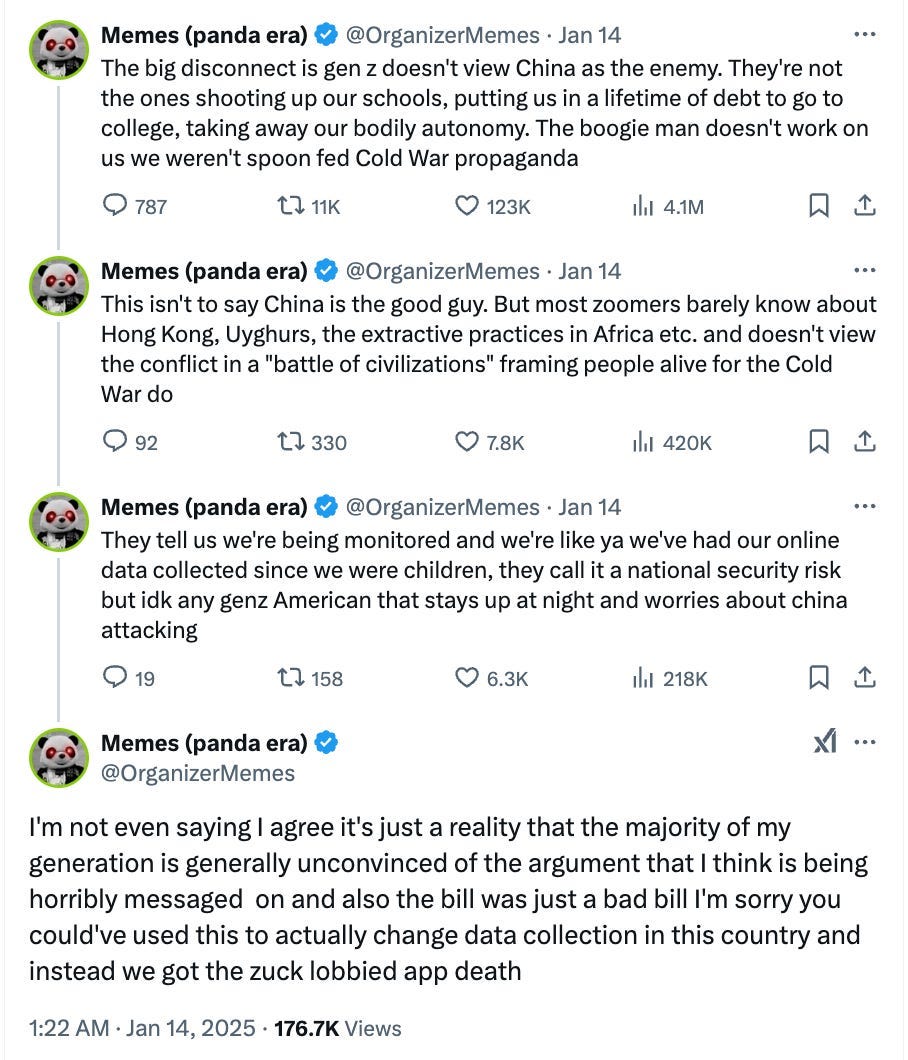Social Media Occasionally Reminds Us it Can Be Social
This simple trick undoes decades of propaganda! On Rednote, TikTok, and the Slop Economy
One of the most fascinating parts of the “migration” to Rednote, or Xiaohongshu, a Chinese app that most similarly resembles Pinterest-meets-Instagram, is that the users who recently joined the app discovered a new community of people just like them, but in a completely different country and context. I think that over the last few years, and by that I mean the last decade, internet users have become inured to shitty behavior online and people being outright mean and cruel. That normalization has kind of dulled our experience of “being online” and kind of helped us usher in the post-pandemic rot era.
Then, as it so happens on the web, the trend to “migrate” (I keep using this in quotes because it really is more a meme than a movement so far) was inspired by Black creators — no strangers to digital migration — who began to use hashtags like #TikTokRefugees and introduced Rednote. This of course went viral and caused the Chinese app to shoot to number one in the app store and Duolingo ironic-post about everyone’s newfound interest in Mandarin.
But to me, something really beautiful happened: for a brief few days, people started earnestly posting about meeting new Chinese friends; friends who have historically been referred to negatively by US politicians and big business (oligarchic) leaders. According to Pew, most American’s have “cold” feelings toward China and its people.
Rednote is a colloquial app and like TikTok, isn’t really made for Western audiences, at least in it’s structural use. TikTok, like it’s Douyin counterpart, are really meant for a sort of branch of the e-commerce industry. You buy something on the app, you make a video with the thing, more people buy the thing, and so on. The content is part of the product. In the US, when TikTok introduced it’s Temu-like market place, we recognized the evolution as the ongoing “enshittification” of the web and apps, but in China, where the e-commerce market place is WAY bigger, this is how popular apps work.
(Also, in retrospect, the real enshittification revealed itself to be sad sack ceos reducing the quality of content moderation and adding AI slop rather than the addition of e-commerce things.)
What was cute was how many users genuinely learned, for the first time (unfortunately), that “Americans are connecting with Chinese citizens and realizing they don't live in an authoritarian state and have bleak lives and not only that: they can afford groceries” as Eric J. Ramos explains on Threads. Another really important aspect is the reveal of how long cultural memory lasts. While the lapse in cultural memory has aided the far-right over the last decade or two, Gen Z is coming in without direct knowledge of the old hegemonic rules and realizing there may be other perspectives.
I think Organizer Memes really nails it though in the following thread. (Alt text added.)
I don’t know how Silicon Valley folk are reacting. My guess is that they’re hoping this is a passing fad. But these events have unknown consequences. I mean 10 years ago, someone pasted a Pepe the Frog head on Trump and, well.
Inside the miasma that is the web (and to also agree that enshittification is happening regardless), there are these wonderful moments that reveal what social media may be, or at least can be. Collectively, we have way more in common with any Chinese worker than any billionaire, but we rarely get opportunities to understand our fellow people.
On the other hand, one of the most frightening and odd moments of this period is the ironic cynicism toward surveillance and privacy. It’s neat in a way that so many people are aware of their status in the surveillance apparatus, but we do have a right to privacy and you have to continue to act on it or it goes away. Normalization of surveillance reduces our rights to our future tense, to borrow a phrase from Shosana Zuboff, and it’s easier than you think to give up simple freedoms.
The Slop Economy is about to have its heydey
We’re about a week away from the new administration which drags along the tech tycoons, maroons, and crypto goons. Trump has not only shown his support of Bitcoin, but allegedly, one of his day one executive orders is going to include deregulation of Bitcoin. It’s gonna get sloppy folks.
When you get a chance (new media homework), read Ezra Marcus’s “The Next Drug Epidemic is Blue Raspberry Flavored” in New York Magazine about Galaxy Gas and the really horrible evolution of whippets. It’s something I knew very little about and this piece shows that this “recreational” drug has moved more mainstream.
Even better, listen to the episode of TruAnon where Brace and Liz interview Ezra about it. The second half of the ep has the team really delving into the awfulness of the slop economy, which I think is best described by Liz as the “in-between economies.” These economies, like OnlyFans chatters or reaction streamers or crypto-day-trader, are really the output of the saturation of the “gig economy” or devaluation of the creator economy.
Years ago, I warned that the normalization of the gig economy and its propagandistic call to action (“work so hard you get to quit the day job”) really just means you get to work two jobs. Cool. Now that we’ve reached “Beastification” and max engagement farming (Brad Podray is a brilliant satirist of the form), we have the slop economies forming.
On the podcast, Ezra explains that the use of nitrous, which basically shuts your brain down for a few seconds, simulates the experience of online virality or crypto trading or online betting in an offline setting. “It’s as though it’s a reaction against experiencing linear time.” The whole industry of “galaxy gas” is a dangerous scam built upon earlier markets like vaping and now Zyn, but this time it creates some real brain damage. We’re in for a really strange era of slopmaxxing if we don’t start understanding how we can help others understand the systems at play.
At the very least, we should talk to each about these issues and try to help each other, especially over the next few weeks.
Finally, on that note, try to pace yourself with the onslaught of news coming up. Not everything needs to be absorbed. There is going to be a lot of garbage thrown out there, focus on the issues that you can respond to. Make room as best as possible for care too - of yourself and others.
Until next time, be curious, be vigilant, and persist.
New Media Homework is a newsletter that takes a critical internet literacy approach to online media and culture. It comes out when I have time to write it. Thank you for reading!!







